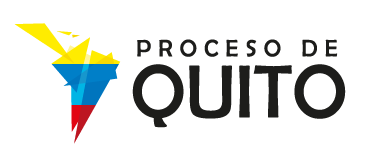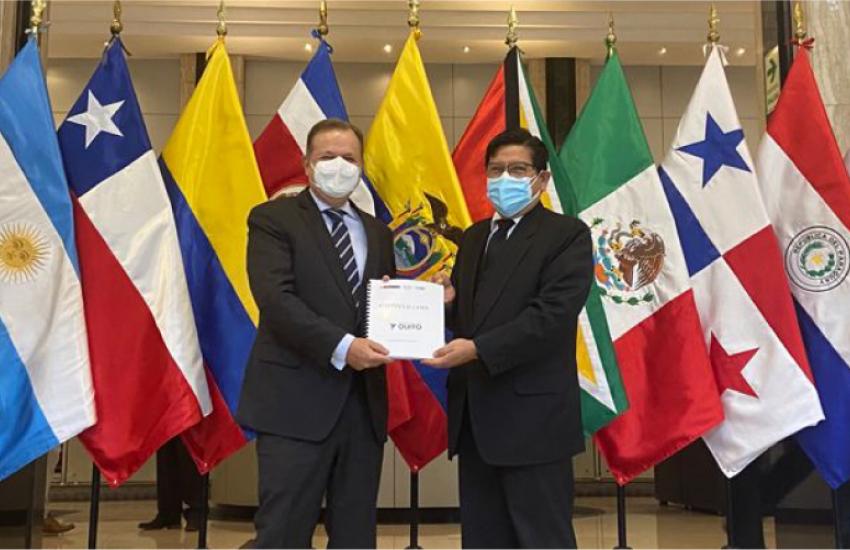BRAZIL ASSUMES LEADERSHIP OF THE QUITO PROCESS
Brazil formally assumed the Pro Tempore Presidency of the Quito Process, confirming its leadership at the head of the regional technical initiative, giving way to the VIII Round: Chapter Brasilia of the Quito Process.
Lima, 22 of June 2021- At the event, which took place at the Ministry of Foreign Affairs of Lima, the Government of Peru passed to Brazil the Pro Tempore Presidency of the Quito Process and the compendium of the work carried out in the VII Round: Lima Chapter.
Ambassador Vitaliano Gallardo, Director of Peruvian Communities Abroad and Consular Affairs of the Ministry of Foreign Affairs of Peru, emphasized the challenges that his country had to face at the head of the Process, such as the COVID-19 pandemic, but also the progress made in terms of socio-economic integration, challenges such as the incorporation of civil society, international cooperation and regional work in a purely technical environment in search of solutions.
Ambassador Gallardo then proceeded to formally hand over the Pro Tempore Presidency to the Brazilian ambassador in Lima, Rodrigo de Lima Baena Soares.
Adriano Pucci, Director of the United Nations Department in Brazil, made the transfer official and said that “The Brasilia chapter should promote reflection so that the actions of the region are even more articulated and recognized, and on how to continue mobilizing international attention in support for the efforts”.
Brazil thus becomes the sixth country to lead the intergovernmental technical process, after Ecuador, Argentina, Colombia, Chile, and Peru.
“Brazil's leadership comes at a time when it is crucial to move towards the implementation of the proposals and when the situation requires increasing international visibility," said Eduardo Stein, Joint Special Representative of IOM and UNHCR for Refugees and Migrants from Venezuelan in the region.
The handover ceremony also counted with the participation of Filippo Grandi, United Nations High Commissioner for Refugees, and Diego Beltrand, Special Envoy of the IOM Director General for the Regional Response to the Situation in Venezuela.
The United Nations High Commissioner for Refugees, Filippo Grandi, thanked Peru for the work carried out and the achievements obtained, and recalled that, “in the midst of the pandemic, the priority is the inclusion of refugees and migrants in policies and programs, as well as allowing their access to international protection”. He also highlighted the support of the international community, demonstrated at the last International Donors Conference and congratulated Brazil, but not before recalling "the willingness and commitment of UNHCR to continue supporting the Quito Process."
Diego Beltrand, on behalf of the Director General of the IOM, António Vitorino, for his part expressed the IOM's determined commitment to the Quito Process, the support for Brazil in assuming the Presidency and the way in which “the Lima Chapter marked a an important point in this intergovernmental initiative, which shows how member countries can work in collaboration to provide an articulated response to a situation that requires the support of the international community ”.
Brazil, in the voice of Minister Adriano Pucci, pledged to work in a coordinated manner with the member states that signed the VII Joint Declaration of the Lima Chapter, and reaffirmed its commitment to continue supporting the search for technical solutions to alleviate the situation of the 4,6 million refugees and migrants from Venezuela in Latin America and the Caribbean.
During the acceptance as the new Pro Tempore Presidency of the Quito Process, Brazil confirmed that it will continue to follow up on the themes of the current working groups and will emphasize during its Presidency the support to the host communities, coordination with international agencies and the civil society, the needs of migrant and refugee youth and the relationship with international cooperation, as well as the implementation of the strategies and mechanisms advanced within the Process, including in response to the serious challenges posed by the Covid-19 pandemic.
What is the Quito Process?
The Quito Process is a regional technical workspace that was born in 2018 at the initiative of Ecuador, with the support of UNHCR and IOM. Today it counts with the participation of 13 countries of the region, which develop coordinated responses to the institutional challenges generated in Latin America and the Caribbean by the flows of refugees and migrants from Venezuela. Eleven countries and financial entities have joined the Quito Process, which are part of the Group of Friends.
Argentina, Brazil, Chile, Colombia, Costa Rica, Ecuador, Guyana, Mexico, Panama, Paraguay, Peru, the Dominican Republic, and Uruguay make up the member countries. In turn, the Group of Friends is made up of Germany, Canada, Spain, the United States, France, the Netherlands, Italy, the United Kingdom, Switzerland, the European Union, and the IDB.


